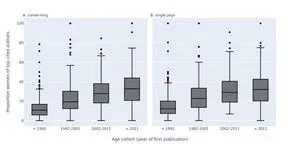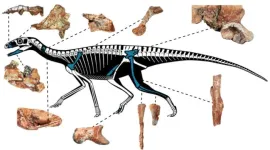(Press-News.org) In Germany, taxing sugar-sweetened beverages could prevent or postpone cases of type 2 diabetes, extend healthy lifespans and save up to €16.0 billion in societal costs over the next 20 years, according to a new study led by Karl Emmert-Fees of the Technical University of Munich, published November 21st in the open access journal PLOS Medicine.
The World Health Organization has recommended that governments worldwide lessen the social and economic burden of cardiometabolic disease by taxing sugar-sweetened beverages. These taxes either reduce consumption by increasing the price, such as the one peso per liter tax in Mexico, or incentivize companies to reformulate their drinks with a lower sugar content, such as the tiered tax structure in the United Kingdom. Germany has not yet implemented a tax on sugar-sweetened beverages, so researchers estimated the health and economic impacts of these two possible taxation scenarios.
Through modeling, the researchers predicted the effects of a 20% tax on sugar-sweetened beverages and a tiered tax similar to the one used in the United Kingdom. For each scenario, they estimated changes in sugar consumption, weight, associated medical and societal costs, and the risk of type 2 diabetes, heart disease and stroke, from 2023 to 2043.
The researchers discovered that during the next 20 years, a tax on sugar-sweetened beverages could reduce sugar intake in the German adult population on average by 1 gram per day, prevent or postpone more than 132,000 cases of type 2 diabetes and save €9.6 billion by encouraging consumers to change their behavior. A tiered structure, however, would reduce sugar consumption on average by 2.34 grams per day, prevent or postpone more than 244,000 cases of type 2 diabetes and save €16.0 billion by incentivizing companies to sell drinks with less sugar.
While both tax systems would help reduce the health burden and societal costs of cardiometabolic disease, the researchers conclude that a tiered tax would likely have the largest impact. The researchers conclude that taxing sugar-sweetened beverages would be a viable policy option for German decision makers that would improve the health of the German population.
Emmert-Fees adds, “Overall, we found that the taxation of sugar-sweetened beverages could have a substantial impact on population health in Germany. Particularly people who consume a lot of these beverages would benefit from the highest reduction in sugar intake.”
#####
In your coverage, please use this URL to provide access to the freely available paper in PLOS Medicine: http://journals.plos.org/plosmedicine/article?id=10.1371/journal.pmed.1004311
Citation: Emmert-Fees KMF, Amies-Cull B, Wawro N, Linseisen J, Staudigel M, Peters A, et al. (2023) Projected health and economic impacts of sugar-sweetened beverage taxation in Germany: A cross-validation modelling study. PLoS Med 20(11): e1004311. https://doi.org/10.1371/journal.pmed.1004311
Author Countries: Germany, United Kingdom, Australia
Funding: see manuscript
END
A simulation study conducted by a team from the Technical University of Munich (TUM) demonstrates that a soft drink tax in Germany would have significant positive effects. In all of the simulated variants evaluated, less sugar was consumed and the rate of illness dropped. This would be a way to reduce costs to the national economy and alleviate the burden on the health care system. There is, however, a difference between taxes aimed at reducing soft drink consumption and taxes aimed at bringing about changes in product formulation.
Sugary beverages increase the risk of obesity and illnesses such as diabetes. Several countries have therefore introduced taxes on soft drinks. In Germany ...
An analysis of 5.8 million authors across all scientific disciplines shows that the gender gap is closing, but there is still a long distance to go. The new research by John Ioannidis of the Meta-Research Innovation Center at Stanford (METRICs) at Stanford University, US, and colleagues, publishes November 21st in the open access journal PLOS Biology.
There is a strong gender gap in science which manifests itself in many ways. One of the most prominent ones is the relative representation of men and women among the scientists whose work receive the most attention in the ...
A set of fossils recovered in Rio Grande do Sul, Brazil’s southernmost state, has brought an extra layer of complexity to the study of the evolutionary history of silesaurids, a family of dinosauriforms (dinosaurs and their close relatives) that lived in the Triassic period between 247 million and 208 million years ago.
In an article published in the Journal of Vertebrate Paleontology, researchers affiliated with institutions in Brazil and the United States show that even with the new fossil assemblage ...
NEW YORK – November 20, 2023 – The Cardiovascular Research Foundation (CRF), in conjunction with the Transcatheter Cardiovascular Therapeutics (TCT) 2023 conference, CRF's annual scientific symposium, announced today the launch of the CRF Scientific Excellence Top 10 (SET-10), a new global annual ranking recognizing academic contributions to interventional cardiovascular medicine.
The SET-10 initiative, aligning with CRF's commitment to advancing the field, aims to recognize and celebrate the extraordinary contributions made by medical and academic ...
Tuesday, Nov. 21, 2023, CLEVELAND: Cleveland Clinic researchers analyzed genes and brain tissue of patients with Alzheimer’s and found that differences in brain immunometabolism – the interactions between the immune system and the ways cells create energy – may contribute to women’s increased risk for the disease and its severity.
The findings, published in Alzheimer’s and Dementia, offer important insight into developing sex-specific treatment and prevention options for Alzheimer’s disease, the sixth-leading ...
Hearing loss affects more than 60 percent of adults aged 70 and older in the United States and is known to be related to an increased risk of dementia. The reason for this association is not fully understood.
To better understand the connection, a team of University of California San Diego and Kaiser Permanente Washington Health Research Institute researchers employed hearing tests and magnetic resonance imaging (MRI) to determine whether hearing impairment is associated with differences in specific brain regions.
In the November 21, 2023 issue of the Journal of Alzheimer’s Disease, researchers reported that individuals enrolled in this observational ...
University of Sussex researchers have developed a more energy-efficient alternative to transmit data that could potentially replace Bluetooth in mobile phones and other tech devices. With more and more of us owning smart phones and wearable tech, researchers at the University of Sussex have found a more efficient way of connecting our devices and improving battery life. Applied to wearable devices, it could even see us unlocking doors by touch or exchanging phone numbers by shaking hands.
Professor Robert Prance and Professor Daniel ...
Day by day, we communicate with our office colleagues to accomplish tasks that are necessary to function. The more than 200 different types of cells in our bodies do the same thing, but the way they communicate with each other isn't as simple as sending an email.
Researchers like Ioannis Zervantonakis are still trying to understand how these cells actually communicate with each other. The assistant professor of bioengineering at the University of Pittsburgh Swanson School of Engineering recently received a National Institute of General Medical Sciences Maximizing Investigators' Research Award, and his project ...
Digital payment platforms such as Venmo work great for sharing a dinner bill with friends, buying gifts at a pop-up shop or making payments without cash or credit cards.
But these digital payment platforms have a dark side: They can be misused for drug dealing and other illicit activity, suggest researchers from the University of California, Davis. And social media apps such as TikTok and Instagram can act as marketing tools for digital drug dealing.
“While platforms like Venmo revolutionize financial interactions, they also highlight the need for ongoing vigilance and adaptive regulatory measures,” said Pantelis ...
The deep sea is home to one of the world's largest communities of animals about which we still know very little. Yet it is already subject to a growing number of human-induced environmental pressures. How do its inhabitants respond to these stressors? A new study led by researchers from the GEOMAR Helmholtz Centre for Ocean Research Kiel, published today in the scientific journal Nature Communications, provides first insights into the stress response of a deep pelagic jellyfish to ocean warming and deep-sea mining induced sediment plumes.
One particular and potentially large environmental stressor for organisms in the deep ocean is the environmental ...





